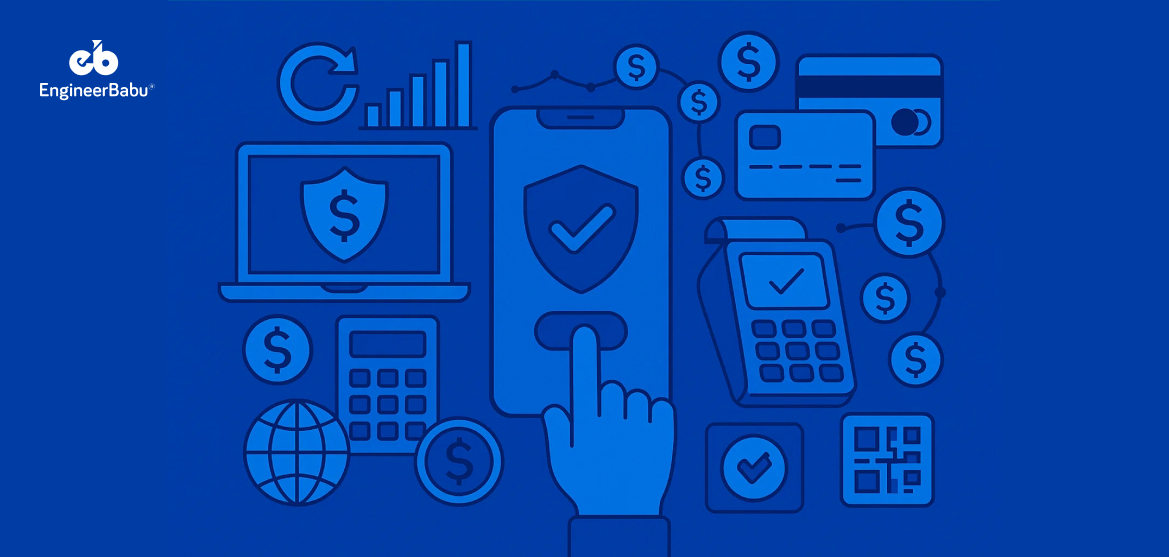Your payment gateway is the tool that connects your business to banks and payment networks, enabling customers to pay using cards, UPI, wallets, or other methods. The smoother and more secure this process is, the more likely customers are to complete their purchase and come back again.
Choosing the right one can feel like picking a co-pilot; one with the perfect blend of speed and security. For startups, especially, the pressure’s on. You need integration that doesn’t require a PhD in software. Onboarding that’s quick enough to turn “landing page” into “we’re live” in under an hour. And fees that don’t eat your margins alive while you’re still figuring out burn rate and runway.
Globally, options like Stripe and PayPal win plaudits for their sleek APIs and universal trust. In India, the game is shifting fast. Gateways like Paytm, Razorpay, and Pine Labs Online are evolving at startup speed, offering everything from instant UPI integration and EMI options to compliance-ready fraud protection and multi-channel adaptability.
Over the next sections, we’ll dig deep into the top 10 gateways that are powering startups like yours. We’ll break down their features, fee structures, and why each might be your ideal payment partner.
Ready? Let’s dive in.
Top Payment Gateways for Startups
1. Stripe
Stripe is one of the most popular payment gateways in the world, trusted by startups and enterprises alike. Known for its developer-friendly API and flexibility, it allows businesses to customise payment flows, integrate with multiple platforms, and scale easily as they grow. For startups targeting a global audience, Stripe’s support for 135+ currencies and local payment methods is a big advantage.
Key Features
- Global Reach: Accepts payments in multiple currencies and supports international cards, wallets, and local payment options.
- Developer-Friendly: Rich API documentation, SDKs, and plugins for quick integration with websites, mobile apps, and eCommerce platforms.
- Recurring Billing: Built-in subscription and invoicing tools for SaaS and membership-based businesses.
- Security: PCI DSS Level 1 compliance, advanced fraud detection with Stripe Radar.
- Customisation: Ability to fully brand the checkout experience or use Stripe Checkout for a ready-made solution.
Fees
- International Payments: Typically 2.9% + 30¢ per successful card charge (varies by country).
- In India: Around 2% per domestic card transaction, 3% for international cards, plus GST.
- No setup fees or monthly charges, purely pay-as-you-go.
Best For: Startups with global ambitions or SaaS models that need flexible, scalable, and developer-friendly payment processing.
2. PayPal
PayPal is one of the most recognized names in online payments, and that brand trust alone can help startups boost conversions, especially when selling to first-time customers. It’s quick to set up, works without heavy coding, and supports transactions in over 200 markets. Whether you’re selling products, services, or digital downloads, PayPal offers a plug-and-play solution that’s easy to integrate into most eCommerce platforms.
Key Features
- Global Trust & Reach: Operates in more than 200 countries and supports 25+ currencies.
- Multiple Payment Methods: Accepts major credit/debit cards, PayPal balance, PayPal Credit, and Buy Now Pay Later (BNPL).
- Easy Integration: Works with Shopify, WooCommerce, Magento, and most popular marketplaces.
- Seller Protection: Safeguards against certain types of fraud and unauthorised transactions.
- Customer Experience: One-touch payments and fast checkout for repeat buyers.
Fees
- International Payments: Around 4.4% + fixed fee (based on currency) for cross-border transactions.
- Domestic Transactions (India): ~2.5% + fixed fee per transaction.
- No monthly fees for standard accounts; merchant plans may vary based on features and volume.
Best For: Startups that value speed of setup, brand trust, and global reach—especially those selling internationally or to customers who prefer PayPal’s buyer protection.
3. Payment Depot
Payment Depot takes a very different approach to payment processing compared to most gateways. Instead of charging a percentage on every transaction, it uses a membership-based pricing model. You pay a flat monthly fee and get access to wholesale interchange rates (the base rates set by card networks). For startups with growing or high transaction volumes, this model can significantly reduce processing costs.
Key Features
- Wholesale Pricing: Access to true interchange rates with no percentage markup from the processor.
- Flat Monthly Fee: Predictable costs make budgeting easier.
- Omnichannel Support: Works for eCommerce, retail POS, and mobile payments.
- Fast Funding: Payments deposited in 24–48 hours.
- Security: PCI-compliant with encryption and fraud prevention tools.
- Dedicated Support: White-glove onboarding and account management.
Fees
- Membership plans start at around $79/month.
- Interchange rate + a small per-transaction fee (typically $0.15).
- No setup fees, no early termination fees.
Best For: Startups processing a high volume of transactions each month and looking to save on percentage-based fees, particularly in the US market.
4. Stax
Stax (formerly Fattmerchant) is another membership-based payment processor, similar in concept to Payment Depot, but with a stronger focus on all-in-one business tools. It combines payment processing with analytics, invoicing, inventory tracking, and customer management—making it especially appealing for startups that want both cost savings and a consolidated business dashboard.
Key Features
- Subscription Pricing: Flat monthly fee with 0% markup on interchange rates.
- All-in-One Dashboard: Includes reporting, analytics, invoicing, recurring billing, and customer data management.
- Omnichannel Payments: Supports in-person, online, and mobile transactions.
- Integration-Friendly: Works with major POS systems, eCommerce platforms, and accounting software.
- Security & Compliance: PCI Level 1, encryption, and fraud detection built in.
- Real-Time Analytics: Helps track sales performance and spot trends quickly.
Fees
- Plans start at $99/month.
- Pay only the interchange rate + $0.08 per transaction.
- No setup fees or long-term contracts.
Best For: Startups and SMBs that want predictable payment processing costs while also benefiting from built-in business management tools—ideal for subscription services, retail, and hybrid businesses.
5. Helcim
Helcim is known for its transparency and no-nonsense pricing. Unlike many providers that bundle extra fees into transactions, Helcim uses a clear interchange-plus model with no monthly subscription for basic use. It’s especially popular among startups that value straightforward costs and the flexibility to accept payments both online and in person.
Key Features
- Interchange-Plus Pricing: Transparent rates with no hidden markups.
- No Monthly Fees: Pay only when you process transactions (optional paid tools available).
- Omnichannel Capability: Accept payments via POS terminals, mobile app, online store, or virtual terminal.
- Built-In Tools: Free online store builder, customer portal, invoicing, and subscription billing.
- Security: PCI Level 1 compliance, tokenisation, and fraud prevention.
- Volume Discounts: Rates automatically improve as your monthly processing volume increases.
Fees
- Interchange + 0.3% + $0.08 for in-person transactions.
- Interchange + 0.5% + $0.25 for online transactions.
- No setup fees or cancellation charges.
Best For: Startups looking for transparent, scalable payment processing without long-term contracts, particularly appealing for those that process payments through multiple channels.
6. Paytm Payment Gateway (India)
Paytm Payment Gateway extends the reach of one of India’s most familiar and widely used fintech brands. For startups, this familiarity translates into instant user trust, which can help improve checkout conversions. The gateway’s infrastructure is built for scale, handling millions of daily transactions across eCommerce, travel, retail, and service-based sectors. It benefits from direct relationships with major banks, which helps maintain high transaction approval rates. Paytm also has deep penetration in tier-2 and tier-3 cities, making it a strategic choice for startups targeting customers beyond India’s metros.
Key Features
- Wide Payment Coverage: Supports UPI, debit/credit cards, net banking, Paytm Wallet, Paytm Postpaid, EMI options, and more through 100+ methods.
- Fast Onboarding: Online, near-instant activation with minimal documentation.
- High Success & Uptime: Intelligent routing, direct bank integrations, and 99.99% uptime ensure smooth performance.
- Next-Day Settlements: T+1 settlement, even during bank holidays—critical for maintaining startup cash flow.
- Startup Programs & Support: The Paytm for Startups program offers access to payment tools, mini-apps, and dedicated support.
Fees
- Zero setup or annual maintenance charges.
- Transaction fees are competitive; specific rates vary by method but remain among the lowest in India.
Best For: Indian startups seeking lightning-fast onboarding, trust from users, and comprehensive domestic payment options, all under one roof.
7. Razorpay
Razorpay has rapidly evolved from a simple payment processor to a comprehensive fintech platform tailored to the needs of modern Indian businesses. Startups are drawn to its agility, both in terms of fast integration and the company’s pace of innovation in the payments space. Razorpay is also known for staying ahead of regulatory changes, ensuring its clients remain compliant without disruption.
Key Features
- Multi‑Mode Support: Accepts credit/debit cards, UPI, net banking, wallets, and EMIs.
- Developer-Friendly: Clean APIs, plugins, SDKs, and fast onboarding make setup frictionless.
- Enhanced Security: PCI DSS Level 1 compliance and advanced anti-fraud measures.
- Startup Benefits: Razorpay’s startup program includes ₹30 lakh+ in credits and fee waivers for eligible startups.
- Smart Routing: AI-powered payment routing boosts success rates by 4–6% through intelligent terminal selection.
Fees
- Typically around 2% + GST per transaction, with no setup or maintenance charges.
Best For: Developer-heavy startups, SaaS platforms, and exporters seeking flexibility, scalability, and smart routing in their payments stack.
8. PayU (India)
PayU is a veteran in India’s payment industry and is known for its strong merchant network, reliability, and focus on secure transactions. What makes it stand out for startups is its dual focus: enabling smooth domestic payments while also providing solutions for cross-border transactions. This is crucial for Indian startups targeting global customers.
Key Features
- Versatile Payments: UPI, cards, net banking, wallets, and recurring billing.
- Risk Controls: Built-in fraud detection and dynamic risk scoring to minimize chargebacks.
- Ease of Use: Integrates with most eCommerce platforms, offering clean API modules.
Fees
- Standard industry rates apply, typically a percentage per transaction; PayU tailors packages for growing startups.
Best For: Startups looking for reliable risk management, mid-to-large volume processing, and an established payment network in India.
9. Pine Labs Online
Pine Labs Online builds on the company’s two decades of leadership in in-store and POS payments, offering startups a gateway that can unify online, offline, and mobile transactions in one ecosystem. Pine Labs supports over 100 payment modes, advanced currency conversion for cross-border sales, and enterprise-grade fraud prevention. It’s also known for strong compliance with RBI, PCI DSS, and GDPR standards, making it a safe bet for startups handling sensitive customer data.
Key Features
- 100+ Payment Modes: From UPI to international cards and wallets, Pine Labs covers it all.
- Omnichannel Support: Seamless commerce across in-store, online, and mobile experiences.
- Security & Compliance: PCI-compliant, with strong fraud safeguards.
- Scalability: Designed to support rapid growth with smart onboarding and integration.
Fees
- Custom pricing based on volume and needs; contact provider for detailed estimates.
Best For: Startups planning to scale across channels, especially those with physical presence, seeking robust infrastructure and multi-layered capabilities.
10. Instamojo
Instamojo is built with the bootstrapped founder in mind. Its gateway service doubles as a lightweight eCommerce platform, letting startups create an online store, list products, generate payment links, and start collecting payments almost instantly. This is especially useful for service-based startups, independent creators, and microbusinesses that want to avoid heavy development work.
Key Features
- Fast Setup: Create a store and payment links instantly—no developer needed.
- Built-In Store: Sell digital downloads, bookings, and physical products directly.
- Flexible Payment Options: UPI, cards, wallets, and more.
Fees
- Generally, a flat percentage per transaction; competitive and transparent for micro-merchants.
Best For: Small startups, freelance sellers, and side hustles that need fast monetization with minimal technical setup.
Conclusion
Choosing the right payment gateway for your startup is not just a technical decision. It is a strategic one. Whether you prioritize global scalability, developer flexibility, fast onboarding, or transparent pricing, there is a platform built for your specific needs.
Stripe and PayPal offer excellent international support. Razorpay and Paytm lead the Indian market with reliable UPI support and quick integration. Platforms like Instamojo and Pine Labs Online cater to startups that need simplified onboarding or omnichannel capabilities.
The key is to assess your business model, customer base, and growth plans. Then choose a gateway that aligns with those goals. A smooth, secure payment experience helps you build trust, improve conversions, and scale faster.
FAQs
1. What is a payment gateway, and why do startups need one?
A payment gateway is a service that allows businesses to securely accept online payments from customers. Startups need one to handle UPI, cards, wallets, and other digital methods with ease and compliance.
2. Which is the best payment gateway for startups in India?
Popular choices include Razorpay, Paytm, and Instamojo. Razorpay is ideal for developers, Paytm offers wide market reach, and Instamojo is great for quick setups with no coding required.
3. What should startups look for in a payment gateway?
Important factors include ease of integration, transaction fees, payout speed, security features, and support for various payment methods like UPI and credit cards.
4. Do payment gateways charge setup or monthly fees?
Most do not charge setup fees. Some like Razorpay and Stripe operate on a pay-as-you-go model, while others like Stax use a monthly subscription for high-volume savings.
5. Can EngineerBabu help integrate payment gateways for startups?
Yes. EngineerBabu offers custom fintech development and can integrate payment gateways like Stripe, Razorpay, and Paytm into web or mobile apps with full security and scalability.




